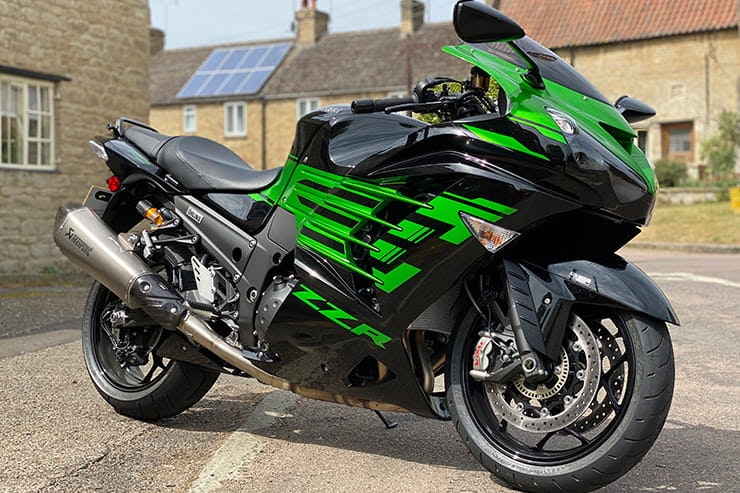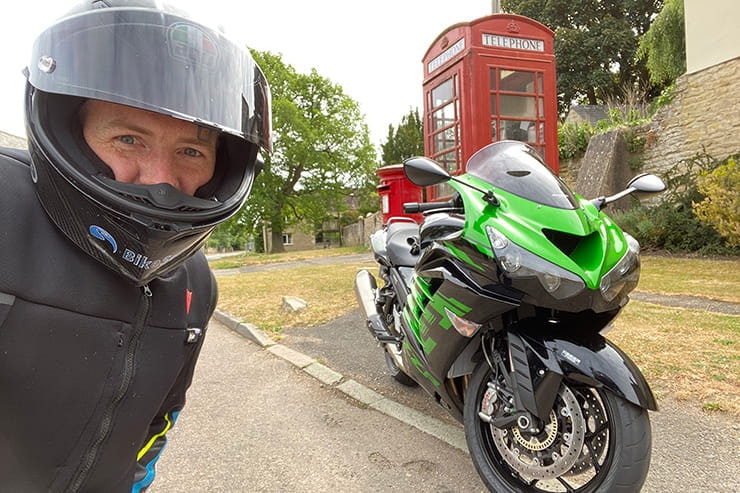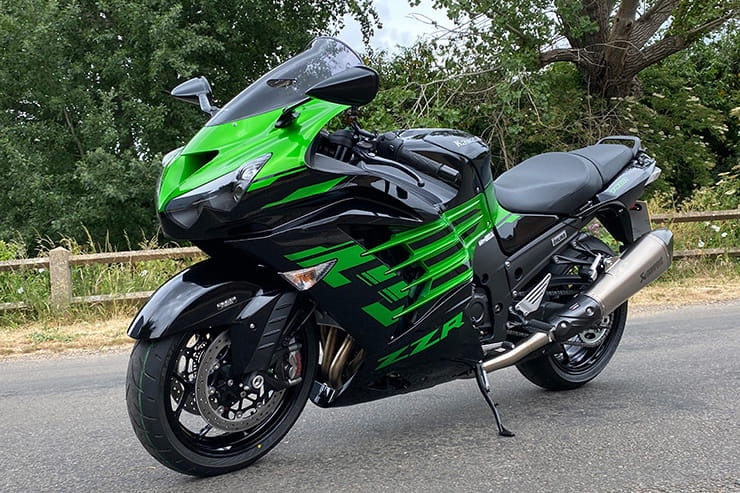Kawasaki ZZR1400 (2020) - Review
By Michael Mann
BikeSocial Managing Editor
23.06.2020
Ah, the ZZR1400, or ZX-14R as it’s known elsewhere in the world; a not-so-lean-but-still-green machine that's been the flagship, normally-aspirated, powerhouse from the Kawasaki corner for so many years but will no longer be in production once the curtain closes on 2020. And, considering the model has been around since 2006, it still provides a strong showing in the Top Trumps battle of horsepower and torque figures against the modern day, and more emissions compliant, warriors. Superseded in the firm’s own headlines by its supercharged sibling, the H2 SX, the big, green and black bear still has a place reserved in the hearts of a generation.
Neither an out-and-out sports bike nor a tourer, the super-sized Kawasaki has often been classified as a sports-tourer but I’d rather label it a ‘super-tourer’ because there’s nothing I’ve ever ridden that fits the bill, and its popularity is especially evident on social media channels. Stick a photo of one up on Facebook and there’s a far more positive response than many/any other motorcycle – each usually has an equal number of detractors as fans.
What was the most powerful road bike on the market back in 2006, the 197.4bhp juggernaut is the Peter Stringfellow of its class - it refuses to grow-up despite being a little long in the tooth, wears a cheeky grin and is certain to offer some quality entertainment. But just how does it compare to modern-day marvels? Does its character stand out above others? Is it worth laying down +£15k on a machine that’s about to go out of production? Maybe that money will only increase in years to come as the ZZR1400 becomes a future classic. If only we had a crystal ball… and the required accompanying belief system.
Covering a few hundred fast, and some not-so-fast, miles on a 2020 ‘Performance Sport’ version, I was suitably amused throughout. I love a sportsbike, or anything with plenty of go – it’s where I get my kicks and galloping along the B645 in Cambridgeshire straddling the ZZR will live in my memory for a long time.
Smooth yet immense power
Strong, sturdy and reassuringly tough feeling
Old school charm
A quickshifter, cruise and heated grips would be useful additions
Width of seat and overall weight rules out the shorter/less confident rider
It’ll be no more after this model *sob*
Above: Jet fighter meets… airplane
2020 Kawasaki ZZR1400 Price
Pound for pound the sub-£16k price tag offers a degree value. The lack of gizmos and gadgets may have a few sucking air through teeth but there are some big numbers on that spec sheet and its appeal as a super-fast ground-coverer is what many like.
While the 2019 standard model is available with an RRP of £12,399, the price on this, the 2020 Performance Sport edition with its adjustable Ohlins shock, Brembo brakes and twin Akrapovic silencers comes with a hefty £15,849 price. This particular model is also only available in the Metallic Diablo Black / Golden Blazed Green colour scheme.
But there are plenty of people who spend a tenner a day on three skinny mocha-chocca-lattes to have far less chemical enjoyment than this. In four years time, Caffeine McCoffeeFace will have spent enough on their trendy habit to have bought a ZZR1400 and the resale value on the short-term rush is a lot less than the equity you’ll have in a four year old Kawasaki.
Above: Akrapovic and Ohlins – two of the very best
Power and torque
The pièce de résistance is the irresistible hoof from the 1441cc in-line four cylinder that is reminiscent of the supercharged litre version in the H2 SX – the ZZR1400’s stablemate and long-term replacement (in some people’s eyes).
The red line is up at 11,000rpm and even though there’s plenty of tingly activity as the revs climb from down low obediently if not enthusiastically, it’s not until the 7000rpm mark where you feel like you might just take off. I’ve never seen an old skool speedo needle move so fast, and the gears are so tall that third gear is just as comfortable in town at 30mph as it is for, er, more than 70 if you have your own runway or track.
Two power mode options are easily toggled via the left-side handlebar switch and are displayed on the rather old-school LCD screen, although why anybody buys a ZZR1400 and then opts for Low Power Mode, is like buying and opening an expensive bottle of red then just sniffing it. But just like some decent plonk, everything is still well-mannered and civilised. Taking nothing away from inline-fours but they don’t bark, twist, snarl and gnash like a V-Twin or V4, and that’s ok because the aloof ZZR1400 knows it can run with the big guns but mature enough not to shout about it.
By the way, in terms of impressive performance the ZZR1400 has measured at a smidge over 5 seconds from 0-100mph and from a standing start to a top speed of 180mph (GPS datalogger) at 22 seconds, so you’d have no problem when keeping up with motorway traffic when pulling on from the slip road.
Engine, gearbox and exhaust
The 1441cc, liquid-cooled, 4-stroke, in-line four cylinder naturally aspirated engine is Euro 4 friendly which is very nice, but on the basis it’s not allowed to make friends with Euro 5 and its emissions regulations-shaped ball, is the reason why the gladiator of sports-like weapons is waving a sad good-bye at the end of 2020. It’s ECU and exhaust system were upgraded in time for the 2016 model year but that’s not good enough to be sold as a new bike from 1st Jan 2021. It is a shame but all good things come to an end, so bask in the glory of the ZZR1400 while you can, and if you’ve not ridden one then what are you waiting for? Call your local Kawasaki dealer now.
Considering the size and weight of bike plus rider, the engine is guided by a beautifully connected throttle and offers a smooth application of power which belies expectations. The mechanical heartbeat is strong with a predictably linear delivery of acceleration – hold on tight because unfortunately it gets too quick too soon. Without realising, the speed becomes an addiction. It coaxes you along – you want to keep those right knuckles rolling towards your shoulder but it’s like poking a bear, it could turn violent very quickly. Or certainly prosecutable. All of a sudden the world is passing by rapidly.
There were no quickshifters on bikes of this age, certainly not as standard manufacturer fit though the Kawasaki gearbox is slick enough not to warrant much clutch use – depending on how mechanically sympathetic your feeling. The 6-speed ‘box is precise with enough of a knowing move-and-click in its gear selection. A contactless gear position sensor was added to the 2016 model which was said to improve shift touch, feel and reliability. And I have to agree, I had no issues up, down or in pursuit of neutral. The gear change was consistent and, crucially, quick.
The distinctive sound of a twin, triple or V4 far exceeds the comparatively tone-deafness of an in-line four yet thankfully Kawasaki added a soupçon of thrash metal with twin Akrapovic titanium silencers to liven up the acceleration – not that you need a lot of livening when your eyeballs are embedded in the back of your skull. Either way, she sounds silky smooth like a purring tiger as well as looking the business too.
2020 Kawasaki ZZR1400 Economy
The bike I rode had just 22 miles on the clock when I took delivery and after a 150-mile day, the digital display had me believe 35.4mpg had been achieved, which I thought was respectable. That sort of figure would have me walking to the next petrol station after 160/170-miles, in fact after a quick stop at 105 miles, the dash informed me of a 35-mile range. I turned the bike on again and it read 45-miles. Like many electronic gauges, I’d take the display as an approximate, that said, most owners say they achieve high thirties, low forties.
Handling, suspension, chassis and weight
In a straight line there’s no rocking this boat because she’s as stable and steady as can be. Why? Because the long wheel base, top class weight distribution and Kawasaki’s aluminium monocoque frame come together to promote a supreme ride quality… in a straight line and gentle radius corners, and that goes for plodding through town at 30mph or folded in behind the screen on a motorway too. Paired with an adjustable Ohlins TTX39 rear shock (new for the 2016 model) offering enough performance variance whether you’re riding solo or loaded with a pillion and luggage, a luscious glidey ride can be expected. A set of Ohlins forks to match the shock would have looked mega, improved the turn-in and softened the braking-related dive too, though they’d have added to the price tag.
If you’re riding in the wet or aggressively in the faster corners then be aware of the Bridgestone S20 tyres – they’re durable and comfortable enough for some decent miles but the initial turn-in and over-shoulder grip was vague and I couldn’t instil much confidence in them when pretending to be Jonathan Rea.
The components making up the ZZR offer the excitement of proper, old-fashioned and unbridled performance while holding plenty of versatility for everyday use in reserve, which emphasises the model’s popularity with such a range of riders – it makes an ideal multipurpose machine for many. Though I should warn of fast roads with crests; if you have TC turned off then you’ll be looking at the sky without much encouragement, if you get what I mean!
2020 Kawasaki ZZR1400 Brakes
Mega Brembo M50 calipers were fitted as standard fit on this model which came to market in 2016 and considering the science behind stopping a machine capable of a sub-3s 0-60mph time plus 186mph (limited, with a gear to spare) yet tips the scales at 268kg, they take very little getting used to if stepping off a more modern and sophisticated machine. The lever and overall brake feel is neatly linear but there’s plenty of suspension dive if deliberately harsh with the pull of your right fingers, ABS is certainly present, available and quick to remind you of its existence while the rear lever might as well not exist for all the good it does.
Comfort over distance and touring
I want to take the opportunity to take about the aesthetics of this long, low missile. Look at it from the side and the lines of those fairing gills match the angle of the fuel tank, silencer and subframe – it’s not a coincidence and it makes the ZZR look damn sexy from side-on, if you like it large. From the front, it’s almost demonic look with the aggressive and symmetrical light cluster add to that moodiness, surrounded by the big shoulders either side. The fins help with heat management from the whopping heart on the inside while the overall ergonomics with the seat, pegs, handlebar triangle add up to a ‘relaxed sport’ riding position. For some taller riders, let’s say 6ft-plus, some may deem it cramped between foot and hip, and this can best be demonstrated if the position of choice is tucked-in behind the screen meaning elbows rest on thighs – handy for ‘resting’ on the longer journey. So, it can be very sporty but most folk will make use of the sofa-like seat which is wide, long and very comfortable to be perched on. Or in, because you do feel part of the bike too. The screen is fine, nothing more. I’d be upgrading to a taller version if I was covering some big miles but if you do too then don’t forget it would affect wind-flow up and over your helmet plus your vision.
Pillion and panniers would be obvious options with touring very much on the agenda of many ZZR1400 owners, and I regret not being able to offer my verdict on either of these. Apologies. And for those banging in the winter miles too, heated grips aren’t standard, nor an official option. While we’re on with the bad news – there’s no underseat space for much, let alone a lock and chain.
Rider aids and extra equipment / accessories
Bikes of a certain age make this section easier to write about, while the ZZR-1400 has the ‘F’ for Full and ‘L’ for Low power modes as well as four levels of traction control, including off, there’s not much else in the way of rider aids. With neither a quickshifter nor heated grips as OEM fitments or the heavily-missed cruise control, the Kawasaki may well be a super cruiser with plenty of comfort, stability and speed to bark about, there’s a lack of refinements to make those longer journey’s easier.
Speaking of big mileage, those looking at the convenience of a pair of panniers might want to consider the additional weight and aerodynamic influence on performance. Top box, centre stand, alternative seats and a GPS bracket are among the official accessories.
Rivals
Big, strong, super fast sports tourers might be a thing of the past (ok, recent past then) and there’s no hiding the fact the ZZR1400 had mainstream Japanese foes in the shape of the effervescent Suzuki GSX1300R Hayabusa and Honda’s CBR1100XX Super Blackbird, though really the ZZR made its breakthrough just as the Blackbird was, er… flying away (sorry). You could probably include the BMW K1200S in there too but for modern day versions then look no further than the emission-friendlier Ninja H2 SX from the same stable, and KTM’s 1290 SuperDuke GT for its power and comfort-over-distance levels. Kawasaki’s own GTR1400, Honda VFR1200 F or BMW R1250RS would be worthy of mentioning and comparing too.
2020 Kawasaki ZZR1400 verdict
What a machine. It’s a formidable bike for the price tag and while every owner loves them, every ex-owner regrets selling it. The ZZR-1400 has a character, a soul. If it were human it would be a weightlifter – tough, purposeful, strong with a menacing ability, steely determination that would be tricky to push around, yet loveable and calm when needed. Where that analogy falls down is the rip-snorting speed at which it covers the ground. A weapon of mass satisfaction, so, so powerful yet can happily cover the miles with comfort high on its agenda. It’ll be sad to see it go but it’s going out on a high. The new generation require more safety-based electronics and cleaner engines but the ZZR14 will be fondly remembered.
If manhandling a big cuddly bear (that has the ability to bite) is your thing and you’ve not yet tried one then get yourself a test ride booked before it’s too late. Change the OEM tyres (especially if riding in the rain) and hone your ability to judge your speed by using the analogue needle and you’ll be ok. And don’t be thinking there’s much tech on board; no cruise control, heated grips or quickshifter either.
2020 Kawasaki ZZR1400 spec
Looking for motorbike insurance? Get a quote for this bike with Bennetts motorcycle insurance


